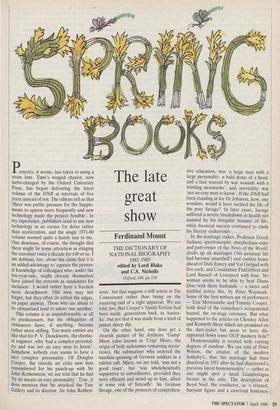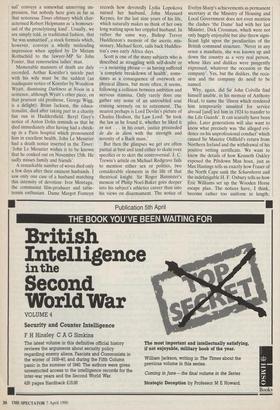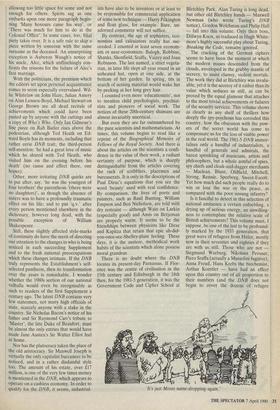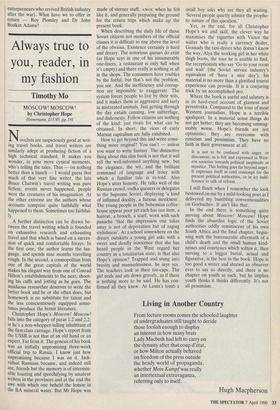The late great show
Ferdinand Mount
THE DICTIONARY OF NATIONAL BIOGRAPHY 1981-1985 edited by Lord Blake and C.S. Nicholls
Oxford, f40, pp.518
Posterity, it seems, has taken to using a zoom lens. Time's winged chariot, now turbo-charged by the Oxford University Press, has begun delivering the latest volume of the DNB at intervals of five years instead of ten. The editors tell us that `there was public pressure for the Supple- ments to appear more frequently and new technology made the project feasible'. In my experience, publishers tend to use new technology as an excuse for delay rather than acceleration, and the single 1971-80 volume seemed quite a handy size to me. One dismisses, of course, the thought that there might be some attraction in stinging the customer twice a decade for £40 or so. I am dubious, too, about the claim that it is an added advantage to 'capture the person- al knowledge of colleagues who, under the ten-year-rule, might already themselves have joined the entrants as candidates for inclusion'. I would rather have a fraction more detachment. Old men may not forget, but they often do soften the edges, on paper anyway. Those who are about to be obituarised tend to salute one another.
This volume is as unputdownable as all its predecessors, but the obliquities of obituarese have, if anything, become rather more stifling. Too many entries are like that for P. V. Danckwerts, the chemic- al engineer, who 'had a complex personal- ity and was not an easy man to know'. Somehow, nobody ever seems to have a nice complex personality. Of Douglas Cooper, the vitriolic art critic now best remembered for his punch-up with Sir John Rothenstein, we are told that he had `by no means an easy personality'. True, it does mention that 'he attacked the Tate Gallery and its director, Sir John Rothen- stein', but that suggests a stiff article in The Connoisseur rather than being on the receiving end of a right uppercut. We are told, too, that Cooper's 'family fortune had been made, generations back, in Austra- lia', but not that it was made from a kind of patent sheep dip. On the other hand, one does get a clearish picture of Sir Anthony `Gamp' Miers (also known as 'Crap' Miers, the origin of both nicknames remaining myste- rious), the submariner who ordered the machine-gunning of German soldiers in a rubber raft. Miers, we are told, 'was not a good loser', but 'was wholeheartedly supportive to subordinates, provided they were efficient and stood up to him, albeit at some risk of fisticuffs'. Sir Graham Savage, one of the pioneers of comprehen- sive education, was 'a large man with a large personality, a bald dome of a head, and a face scarred by war wounds with a bristling moustache', and, inevitably, was `not an easy man to know'. If the DNB had been standing in for Dr Johnson, how, one wonders, would it have tackled the life of the poet Savage? 'In later years, Savage suffered a severe breakdown in health not assisted by his irregular manner of life, while financial success continued to elude his literary endeavours . .
In the marriage stakes, Professor Derek Jackson, spectroscopist, steeplechase-rider and part-owner of the News of the World, clocks up six marriages ('his personal life had become unsettled') and canters home ahead of Dick Emery and Val Gielgud with five each, and Constantine FitzGibbon and Lord Russell of Liverpool with four. No woman seems to be able to beat Diana Dors with three husbands — a sweet and truthful notice this, by Peter Waymark. Some of the best notices are of performers — Eric Morecambe and Tommy Cooper, both dead of the comedian's occupational hazard, the on-stage coronary. But what happened to the articles on Chesney Allen and Kenneth More which are promised on the dust-jacket but seem to have dis- appeared down some OUP memory hole?
Homosexuality is treated with varying degrees of candour. We are told of Peter Wilson, the creator of the modern Sotheby's, that 'his marriage had been dissolved in 1951 after he had discovered a previous latent homosexuality' — rather as one might spot a small Giambologna bronze in the attic. The description of Boyd Neel, the conductor, as 'a relaxed, buoyant figure and a convivial homosex- ual' conveys a somewhat unnerving im- pression, but nobody here goes as far as that notorious Times obituary which char- acterised Robert Helpmann as 'a homosex- ual of the proselytising kind'. Usually, we are simply told, in traditional fashion, that he was unmarried', a stock formula which, however, conveys a wholly misleading impression when applied by Dr Miriam Rothschild to the lawyer-MP Sir John Foster, that remorseless ladies' man.
Memorable manners of death are duly recorded. Arthur Koestler's suicide pact with his wife must be the saddest (an inadequate notice of Koestler by Woodrow Wyatt, dismissing Darkness at Noon in a sentence, although Wyatt's other piece, on that prurient old prodnose, George Wigg, is a delight). Brian Jackson, the educa- tionalist, died after taking part in a charity fun run in Huddersfield. Beryl Grey's notice of Anton Dolin reminds us that he died immediately after having had a check- up in a Paris hospital which pronounced him in excellent health. John Le Mesurier had a death notice inserted in the Times: `John Le Mesurier wishes it to be known that he conked out on November 15th. He sadly misses family and friends'.
A remarkable number of wives died only a few days after their eminent husbands. I saw only one case of a husband matching this intensity of devotion: Ivor Montagu, the communist film-producer and table- tennis enthusiast. Dame Margot Fonteyn records how devotedly Lydia Lopokova nursed her husband, John Maynard Keynes, for the last nine years of his life, which naturally makes us think of her own long waiting upon her crippled husband. In rather the same way, Bishop Trevor Huddleston's memoir of the ascetic mis- sionary, Michael Scott, calls back Huddles- ton's own early Africa days.
Scott is one of the many subjects who is described as struggling with self-doubt or — a recurring phrase — as having suffered 'a complete breakdown of health', some- times as a consequence of overwork or physical illness, but more often, it seems, following a collision between ambition and nervous stamina. Only rarely does one gather any sense of an untroubled soul cruising serenely on to retirement. The nearest perhaps is Lord Devlin's picture of Charles Hodson, the Law Lord: 'he took the law as he found it, whether he liked it or not . . . in his court, justice proceeded de die in diem with the strength and serenity of a Bach mass.'
But then the glimpses we get are often partial at best and tend either to skate over specifics or to skirt the controversial. J. C. Trewin's article on Michael Redgrave fails to mention either sex or politics, two considerable elements in the life of that theatrical knight. Sir Roger Bannister's memoir of Philip Noel-Baker goes deeper into his subject's athletics career than into his views on disarmament. The notice of Evelyn Sharp's achievements as permanent secretary at the Ministry of Housing and Local Government does not even mention the clashes 'the Dame' had with her last Minister, Dick Crossman, which were not only hugely enjoyable but also threw signi- ficant light upon the peculiarities of the British command structure. 'Never in any sense a mandarin, she was known up and down the country as a very real person, whose likes and dislikes were pungently expressed, whatever the occasion or the company'. Yes, but the dislikes, the occa- sion and the company do need to be named. • Why, again, did Sir John Colville find himself unable, in his memoir of Anthony Head, to name the 'illness which rendered him temporarily unsuited for service abroad [and] led him in 1924 to transfer to the Life Guards'. It can scarcely have been piles. Later generations will also want to know what precisely was 'the alleged evi- dence on his unprofessional conduct' which caused Sir Maurice Oldfield's return from Northern Ireland and the withdrawal of his positive vetting certificate. We want to know the details of how Kenneth Oakley exposed the Piltdown Man hoax, just as Max Hastings tells us exactly how Fraser of the North Cape sank the Scharnhorst and the indefatigable H. F. Oxbury tells us how Eric Williams set up the Wooden Horse escape plan. The notices have, I think, become rather too uniform in length, allowing too little space for some and not enough for others. Spirits sag as one embarks upon one more paragraph begin- ning 'Many honours came his way', or 'There was much for him to do at the Colonial Office'. In some cases, too, filial piety takes over. It is a safe rule to skip a piece written by someone with the same surname as the deceased. An unsurprising exception is Auberon Waugh's notice of his uncle, Alec, which unflinchingly con- fronts the reasons for the failure of Alec's first marriage.
With the politicians, the premium which the editors set upon personal acquaintance comes to seem especially overvalued. Wil- lie Whitelaw on John Hare, Julian Amery on Alan Lennox-Boyd, Michael Stewart on George Brown are all dead recitals of achievements which could have been pasted up by anyone with the cuttings and a copy of Who's Who. Only Ian Gilmour's fine piece on Rab Butler rises above the pedestrian, although Ted Heath on Ed- ward Boyle has its moments, including that rather eerie DNB trait, the third-person self-mention: 'he had a great love of music which he shared with Ted Heath, who visited him on the evening before his death' (no cause and effect there, one hopes).
Other, more irritating DNB quirks are to put after, say, 'he was the youngest of four brothers' the parenthesis *here were no daughters)', as though the absence of sisters was to have a profoundly traumatic effect on his life; and to put 'q.v.' after every person mentioned elsewhere in the dictionary, however long dead, with the possible exception of William Shakespeare.
Still, these slightly affected style-marks of continuity do have the merit of directing our attention to the changes in who is being noticed in each succeeding Supplement and to the fresh national preoccupations which these changes intimate. If the DNB truly represents the Establishment's self- selected pantheon, then its transformation over the years is remarkable. I wonder whether the 1980s section of our national valhalla would even be recognisable as such to readers of the first Supplement a century ago. The latest DNB contains very few statesmen, not many high officials of state, scarcely anyone with a stake in the country. Sir Nicholas Bacon's notice of his father and Sir Raymond Carr's tribute to `Master', the late Duke of Beaufort, must be almost the only entries that would have made Jane Austen's Sir Walter Elliot feel at home.
Nor has the plutocracy taken the place of the old aristocracy. Sir Maxwell Joseph is virtually the only capitalist buccaneer to be noticed, and in a rather disdainful style too. The amount of his estate, over £17 million, is one of the very few times money is mentioned in the DNB, which appears to operate on a cashless economy. In order to qualify for the DNB, it seems, industrial- ists have also to be inventors or at least to be responsible for commercial application of some new technique — Harry Pilkington and float glass, for example. Bare, un- adorned commerce will not suffice.
By contrast, the age of sophisters, eco- nomists and calculators really has suc- ceeded. I counted at least seven econom- ists or near-economists: Balogh, Robbins,. Shanks, Shonfield, Sraffa, Vaizey and Joan Robinson. The last named, a strict vegeta- rian, in later life slept all year round in an unheated hut, open at one side, at the bottom of her garden. In spring, tits in search of nesting material would wake her by pecking at her long grey hair.
I counted even more 'educationists', not to mention child psychologists, psychiat- rists and pioneers of social work. The notices of these 20th-century shamans are almost invariably uncritical.
But even they are far outnumbered by the pure scientists and mathematicians. At times, this volume begins to read like a reprint of the Biographical Memoirs of Fellows of the Royal Society. And there is about the articles on the scientists a confi- dence in the value of their work, a radiant certainty of purpose, which is sharply distinguishable from the articles covering the ruck of scribblers, placemen and bureaucrats. It is only in the descriptions of Paul Dirac's equations that you see the word 'beauty' used with real confidence. By comparison, the lives of poets and painters, such as Basil Bunting, William Empson and Ben Nicholson, are told with dry restraint — although Wain on Larkin (especially good) and Amis on Betjeman are properly warm. It seems to be the friendships between physicists like Dirac and Kapitza that retain that epic ah-did- you-once-see-Shelley-plain feeling. These days, it is the austere, methodical work habits of the scientists which alone possess moral grandeur. There is no doubt where the DNB locates its present-day Parnassus. If Flor- ence was the centre of civilisation in the 15th century and Edinburgh in the 18th then, for the 1981-5 generation, it was the Government Code and Cipher School at Bletchley Park. Alan Turing is long dead, but other old Bletchley hands — Maxwell Newman (who wrote Turing's DNB notice), Gordon Welchman and Philip Hall — fall into this volume. Only their boss, Dillwyn Knox, so traduced in Hugh White- more's highly successful play about Turing, Breaking the Code, remains ignored.
The cracking of the German ciphers seems to have been the moment at which the modern muses descended from the clouds, enveloped in the grubby mantle of secrecy, to assist clumsy, violent mortals. The work they did at Bletchley was invalu- able, yet it is the secrecy of it rather than its value which seduces us still, as can be proved by the equal glamour that attaches to the most trivial achievements or failures of the security services. This volume shows as clearly as any shelf of thrillers how deeply the spy-psychosis has corroded this country, how the obsession with the pow- ers of the secret world has come to compensate us for the loss of visible power in the real world. The 1981-5 DNB immor- talises only a handful of industrialists, a handful of generals and admirals, the barest sprinkling of musicians, artists and philosophers, but a whole armful of spies, spy chiefs and cloak-and-dagger merchants — Maclean, Blunt, Oldfield, Mitchell, Strong, Rennie, Sporborg, Sweet-Escott. Yet how much did such people really do to win or lose the war or the peace, as compared with the poor unsung infantry? Is it fanciful to detect in this selection of national eminence a certain enfeebling, a drying up of serious energy, an unwilling- ness to contemplate the relative scale of British achievements? This volume must, I suppose, be one of the last to be profound- ly marked by the 1933 generation, that great wave of refugees from Hitler, mostly now in their seventies and eighties if they are with us still. Those who are not Siegmund Warburg, Nikolaus Pevsner, Piero Sraffa (actually a Mussolini fugitive), Anna Freud, Hans Krebs the biochemist, Arthur Koestler — have had an effect upon this country out of all proportion to their numbers (and the DNB does not begin to cover the dozens of refugee flat :110.11'S ,,rune-droppmg entrepreneurs who revived British industry after the war). What have we to offer in return — Roy Plomley and Dr John Bodkin Adams?





























































 Previous page
Previous page